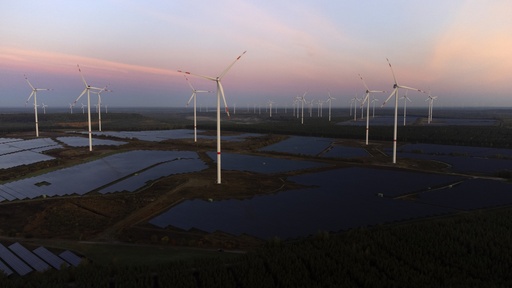As Germany approaches a governmental shift, climate specialists express optimism that the recent election outcomes will reinforce the nation’s commitment to leading the charge against climate change and advancing renewable energy initiatives.
Current targets for Germany’s climate policies are ambitious, with plans to cut greenhouse gas emissions from coal, oil, and gas by 65% by the year 2030. The country aims to achieve climate neutrality by 2045, meaning it will balance emitted pollutants with those removed from the atmosphere. Additionally, Germany intends to completely phase out coal-fired power generation by 2038 and generate over 54% of its energy from renewable sources, including wind, solar, and nuclear energy.
Both Friedrich Merz’s conservative coalition and the center-left Social Democrats—likely partners in the new governing coalition—have previously declared their support for these climate objectives.
Linda Kalcher from the Berlin think tank Strategic Perspectives expects Germany to maintain its current environmental trajectory, but suggests a shift in the narrative surrounding these efforts. She notes that while the new government’s policies may not directly reference climate initiatives, they are likely to focus on themes like prosperity, innovation, and competitiveness, even if the ultimate aims remain aligned with environmental goals.
Despite the economy and migration being central topics during the election campaign, climate change remains a top priority for many Germans, according to several analysts. Kalcher mentioned that it consistently ranks among the top four issues for voters across party lines.
In the recent elections, the Greens, known for their climate advocacy, obtained 11.6% of the vote but are anticipated to shift into opposition after three years in power. The climate-focused Left Party garnered 8.8%. However, Kalcher remarked that pressing issues like inflation and geopolitical conflicts have overshadowed climate discussions during the campaign.
With the United States pivoting away from climate priorities under Trump, promoting fossil fuel interests, there exists “both a necessity and an opportunity” for Germany and Europe to uphold their status as climate leaders, explained Marc Weissgerber from the climate think tank E3G. He added that the prospective ruling coalition would likely support pro-European and pro-multilateral policies, ensuring a commitment to U.N. climate negotiations and adherence to the Paris Agreement, from which the U.S. has withdrawn.
Weissgerber believes this scenario creates a mutually beneficial situation for all involved.
Germany’s current climate law, established in 2019, sets a legally binding framework for meeting its climate objectives on schedule. There exist numerous initiatives emphasizing the expansion of renewable energy, energy storage, and electrification, laying a robust foundation for the incoming government, according to Julia Metz, a policy expert focused on climate at Agora Industry.
Metz emphasizes the importance of maintaining momentum, not only to reduce emissions but also to decrease energy costs in the long run and lessen reliance on fossil fuel imports. She notes that while the new administration might explore carbon capture technologies, it is essential not to neglect strategies aimed at emission reductions to prevent becoming locked into fossil fuel dependencies.
This focus is critical, as experts believe Germany is striving to regain its competitive economic advantage. Kalcher highlights that clean technology sectors and eco-friendly products can play a significant role in revitalizing Germany’s competitiveness in the global market.
